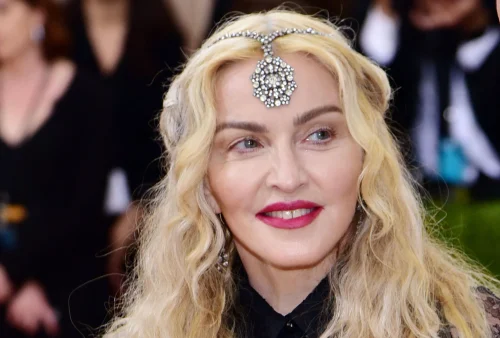Madonna Louise Ciccone, known mononymously as Madonna, is more than just a pop icon; she is a cultural phenomenon whose career spans over four decades. Bursting onto the scene in the early 1980s, she quickly ascended to the zenith of pop music with hits like “Like a Virgin” and “Material Girl.” Her music, often a blend of pop, dance, and electronic, is only part of the story. Madonna’s ability to continually reinvent herself while maintaining a distinct, personal brand has made her a permanent fixture in the constantly changing music landscape.
Madonna’s impact on pop music extends beyond her chart-topping hits; she has fundamentally shaped the genre’s artistic expression and business practices. Known for her relentless innovation and meticulous control over her image and career, Madonna has crafted a persona that blends provocative artistry with savvy business acumen. This fusion has not only fueled her longevity but has also set a standard for branding in the music industry.
In the context of Madonna’s career, branding isn’t just about logos and marketing strategies; it’s about storytelling, consistency, and evolution. Through a keen understanding of media narratives and public perception, Madonna has expertly managed her image, responding to cultural shifts while staying true to her core identity. This strategic use of branding and media is central to understanding how she has remained at the forefront of the industry through the MTV era, the digital revolution, and beyond.
Establishing a Brand
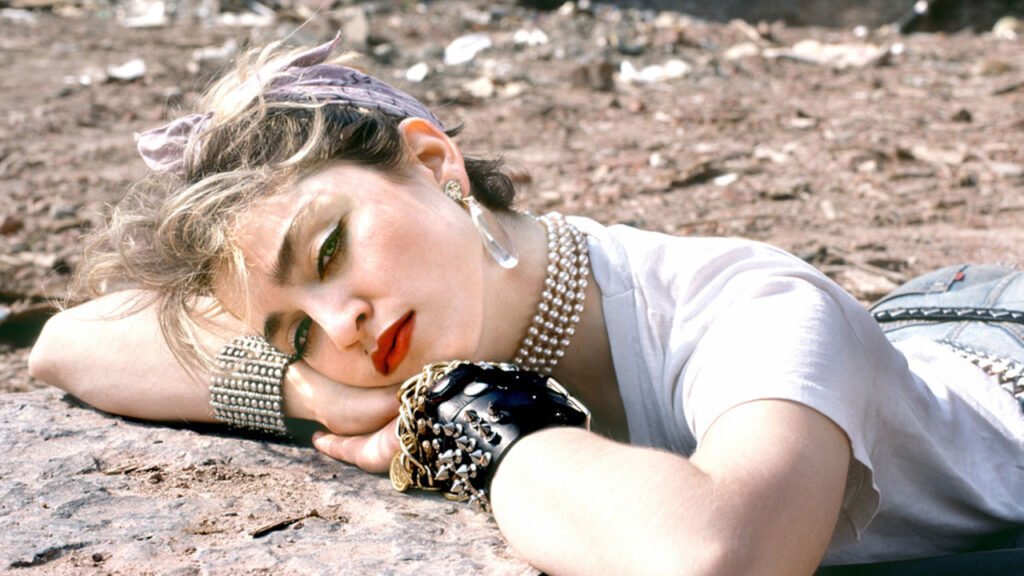
Early Career Moves
Madonna’s initial steps in the music industry were as audacious and bold as the personality she would come to be known for globally. Arriving in New York City in 1978 with just a few dollars to her name, she immersed herself in the vibrant downtown scene, performing with rock bands and engaging in modern dance troupes. By 1982, she had secured a deal with Sire Records, a label known for its cutting-edge artists. Her debut single, “Everybody,” was a club hit, showcasing her knack for catchy hooks and danceable beats.
This early success was a precursor to her breakout album, Madonna, in 1983, which featured hits like “Holiday” and “Lucky Star.” These initial choices and successes in her career were not just by chance; they were a clear indicator of her understanding of self-marketing, capturing the dance-pop zeitgeist of the time and using the burgeoning medium of music videos to extend her reach.
Defining Characteristics
What truly set Madonna apart in her early career was her unique blend of street-smart chic and glamorous style, which became iconic. Her fashion—lace tops, skirts over capri pants, crucifix jewelry, and bleached hair—was as integral to her identity as her music. This distinctive style did not just appeal to the public’s eye but also spoke to a certain authenticity that fans could relate to, which was Madonna herself orchestrating her image.
Musically, she mixed pop with underground club beats, a testament to her days in New York’s dance scene, making her sound both mainstream and edgy. Her public persona, marked by an unapologetic assertiveness and overt sexuality, challenged societal norms and made her a figure of both adoration and controversy.
Cultural Impact
Madonna’s early career choices had a profound resonance with the 1980s music scene and laid the groundwork for her influential role in pop culture. She was not merely a pop artist; she was a cultural trendsetter. Her music and style influenced fashion trends and brought underground dance music into the mainstream. By leveraging the power of MTV, which was in its nascent stage during her rise, Madonna became an omnipresent force in the lives of the youth. Her performances and music videos, which often featured elaborate choreography and cinematic storytelling, set a new standard for what artists could do with the medium.
Moreover, Madonna’s fearless approach to expressing female sexuality and autonomy resonated with the burgeoning feminist movement. She used her platform to tackle social issues, pushing boundaries and sparking conversations about sexuality, gender, and power dynamics. This boldness not only solidified her brand as a symbol of independence and strength but also inspired a generation to embrace their identities and challenge societal expectations.
Evolution of the Madonna Brand
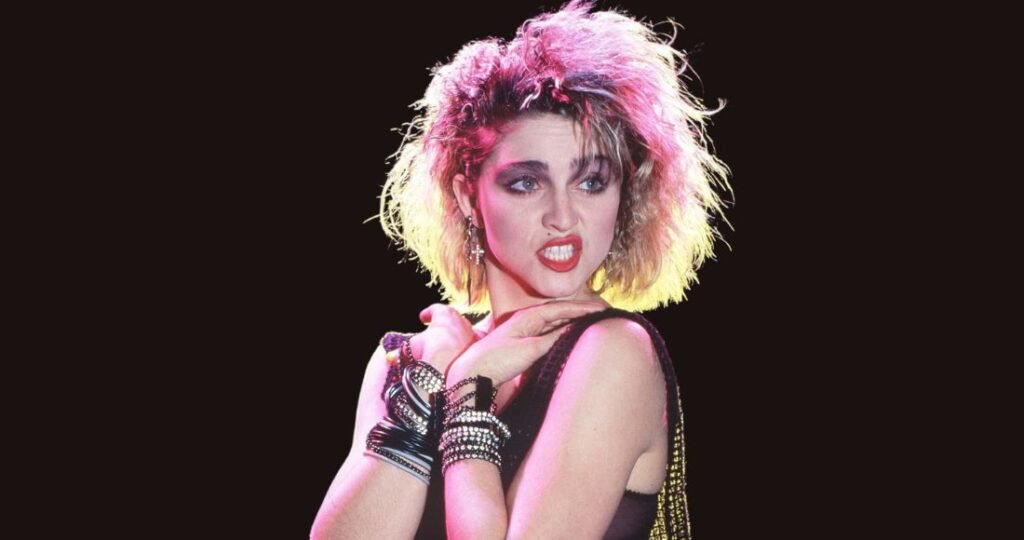
Reinvention Over Time
Madonna’s career is a textbook example of reinvention, each phase marking a distinct shift in both her musical output and public persona. From the street-savvy pop of Like a Virgin (1984) to the spiritual and electronic influences of Ray of Light (1998), each album era presented a new Madonna to the world. Like a Virgin showcased a more polished, yet provocatively confident Madonna, an image amplified by her iconic performance at the MTV Video Music Awards where her bridal outfit became one of the most discussed pop culture moments of the decade. This transition underscored her knack for understanding the visual and thematic components that resonated with audiences globally.
Another significant reinvention occurred with Ray of Light. Here, Madonna embraced spirituality and electronica, collaborating with producer William Orbit to craft a sound that was both futuristic and introspective. This era reflected her personal changes, including motherhood and her exploration of Kabbalah, demonstrating how her personal evolution was seamlessly integrated into her brand.
The 2005 album Confessions on a Dance Floor marked yet another pivotal phase, returning her to her disco and dance roots but with a modern twist. This album, cohesive in its sound and narrative, reasserted her dominance on the dance charts and reminded the world of her ability to set—and reset—the trends.
Adapting to Changes
Madonna’s branding strategies have continually evolved with changes in the music industry and broader cultural landscapes. In the early 2000s, as the industry grappled with the digital revolution and the decline of traditional album sales, Madonna was pioneering in her approach to deals and distribution. Her decision to sign a comprehensive 360 deal with Live Nation in 2007 was groundbreaking, encompassing touring, albums, merchandise, and other revenue streams, illustrating her forward-thinking approach to the evolving music business model.
Culturally, Madonna has adeptly navigated shifts in societal norms and values by aligning her music and messaging with current issues, from advocating for LGBTQ rights to supporting humanitarian causes, thereby keeping her brand relevant and respected.
Maintaining Relevance
Continuous innovation is the cornerstone of Madonna’s branding strategy. Her ability to anticipate and even influence music trends has kept her brand at the forefront of the industry. Madonna has not shied away from leveraging new technologies and platforms, from her early adoption of music videos in the 80s to her embrace of streaming platforms and social media in the digital age. Each new album and tour is accompanied by fresh visual themes and innovative concert staging, which not only generates media buzz but also re-engages her diverse fan base.
Moreover, her willingness to collaborate with rising artists and producers has introduced her to younger audiences and kept her sound contemporary. These collaborations, whether they’re with established icons or emerging stars, highlight her uncanny ability to bridge generational divides, remaining a relevant and influential figure in the fast-paced world of pop music.
Business Moves
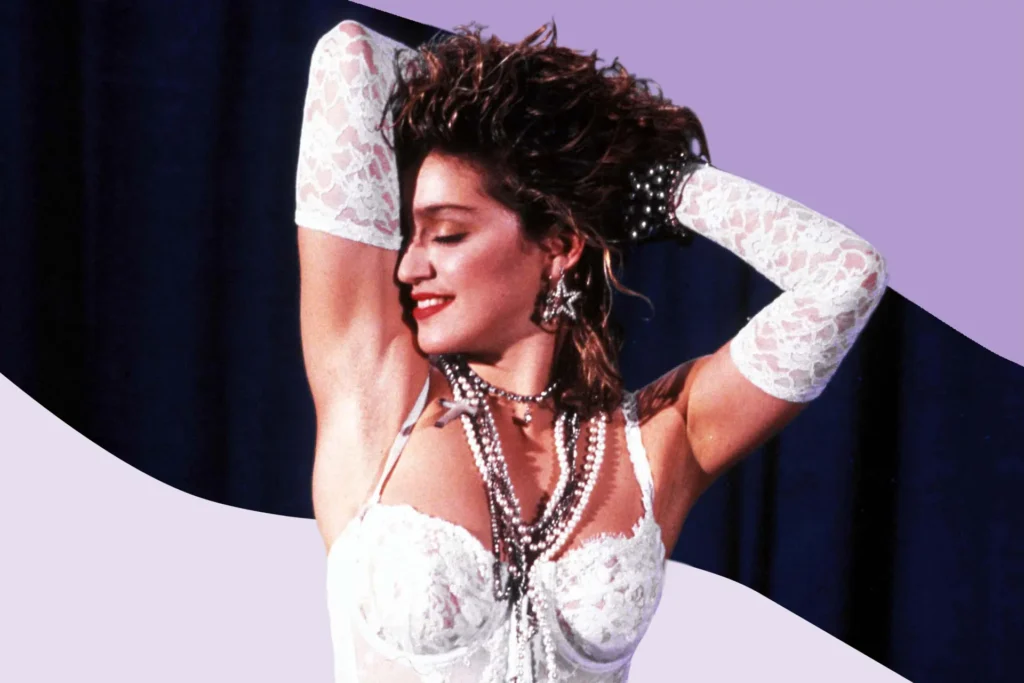
Diversification
Madonna’s ventures extend far beyond her musical endeavors, reflecting a strategic approach to diversification that has significantly fortified her brand. In fashion, she has been both a trendsetter and a designer, launching the “Material Girl” clothing line in 2010. This junior’s fashion line, inspired by her iconic style, was a collaborative effort with her daughter Lourdes and offered at major retailers, blending accessibility with the star’s signature flair. Additionally, Madonna has ventured into the luxury segment with her “Truth or Dare” lifestyle brand, which includes fragrances and footwear, showcasing her understanding of her broad appeal.
In the realm of film, Madonna has had a varied career both in front of and behind the camera. Notable acting roles include films like “Desperately Seeking Susan” and “Evita,” the latter earning her a Golden Globe Award. Moreover, her directorial efforts, such as “W.E.,” highlight her deep interest in visual storytelling and her capability to guide larger creative projects.
Madonna’s influence also stretches into the world of children’s literature. Her series of books, beginning with “The English Roses” in 2003, has been translated into multiple languages, showing her ability to connect with a younger audience and expand her brand into family homes globally.
Partnerships and Endorsements
Madonna’s ability to align with other brands and artists has been a critical aspect of her business strategy, amplifying her relevance and reach. Her endorsements and partnerships have often been groundbreaking, such as her deal with Pepsi in 1989, which was unprecedented at the time for its scale. Though it ended contentiously, the buzz it created was emblematic of Madonna’s knack for capturing public attention. More recently, her collaboration with luxury fashion brands like Dolce & Gabbana and Louis Vuitton has melded high fashion with pop culture, reinforcing her status as a fashion icon.
Her musical collaborations, too, have been a strategic part of her brand maintenance, partnering with younger artists and producers from Britney Spears and Justin Timberlake to Maluma and Diplo. These collaborations not only bring fresh sounds to her albums but also connect her with the next generation of music listeners.
Touring
Madonna’s tours, such as the “Blond Ambition” tour in 1990 and the “Rebel Heart” tour in 2015-2016, are not just concerts but multimedia theatrical events that showcase her brand’s blend of music, fashion, and message. “Blond Ambition” was particularly pivotal, setting a new standard for live music performances with its elaborate choreography, groundbreaking stage design, and explicit thematic content. It solidified Madonna’s reputation as a superb live performer and a daring cultural provocateur.
The “Rebel Heart” tour demonstrated her undiminished ability to draw global audiences, grossing $169.8 million and reaffirming her status as one of the top-grossing touring artists of all time. These live performances are crucial for fan engagement, allowing her to maintain a tangible connection with her audience, which is vital for sustaining her brand’s emotional resonance.
Media and Public Relations
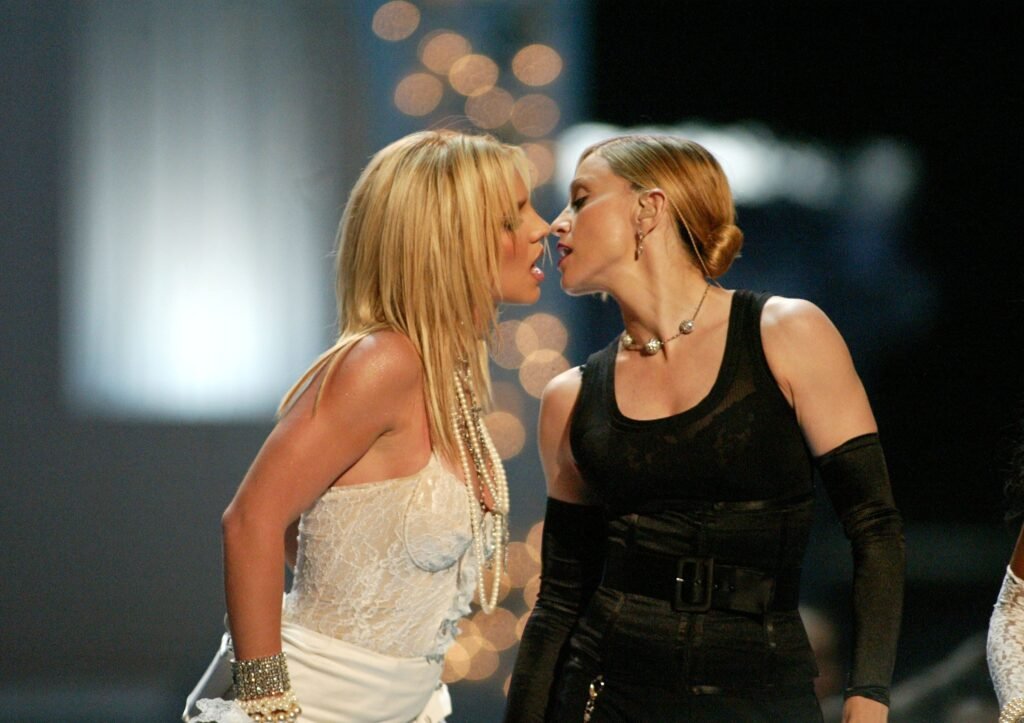
Controversy as Strategy
Throughout her career, Madonna has adeptly used controversy to maintain relevance and ensure that she remains at the forefront of the public’s consciousness. Starting with the uproar over her “Like a Virgin” performance at the 1984 MTV Video Music Awards to the religious symbolism in her “Like a Prayer” video, Madonna has never shied away from pushing boundaries.
These controversies often sparked widespread debate and media coverage, reinforcing her image as a provocative and fearless artist. This strategy not only kept her music in the news but also cemented her status as a cultural icon who challenges social norms. The calculated use of controversy has been integral to her brand, keeping her relevant in an ever-changing pop culture landscape and ensuring that her releases and actions garner maximum visibility.
Media Relations
Madonna’s interactions with the media have been a critical component of her branding strategy. She has been both lauded and criticized by the press but has always managed to maintain a complex relationship with media outlets that balances accessibility with mystique. Madonna has used high-profile interviews, often timed with album releases or major tours, to shape her narrative and connect with audiences on her terms. Her ability to be candid and controversial in interviews and public appearances has kept her in the media spotlight, reinforcing her brand as open yet enigmatic.
Her public appearances are meticulously crafted, from red carpet events to charity functions, ensuring that every appearance reinforces her brand attributes of glamour, intelligence, and compassion. These appearances not only keep her image consistent and in the public eye but also allow her to direct the media narrative, often shifting focus back to her professional work and philanthropic efforts when needed.
Fan Engagement
Madonna has embraced social media and digital platforms as tools to engage directly with her fans, bypassing traditional media channels to control and disseminate her message. Her presence on platforms like Instagram and Twitter allows her to maintain a personal connection with her audience, sharing moments from her life and work that reflect her brand’s values and aesthetic. This direct line of communication keeps her fans engaged and provides a platform for immediate feedback and interaction.
Madonna also uses these platforms for strategic announcements and promotions, maximizing reach and engagement. During album launches, tours, or other major projects, she leverages her online presence to create buzz and drive discussion. For instance, her use of live streaming for behind-the-scenes looks at rehearsals or music video shoots offers fans exclusive content that feels personal and unfiltered, enhancing their loyalty and deepening their connection to her brand.
Impact and Legacy
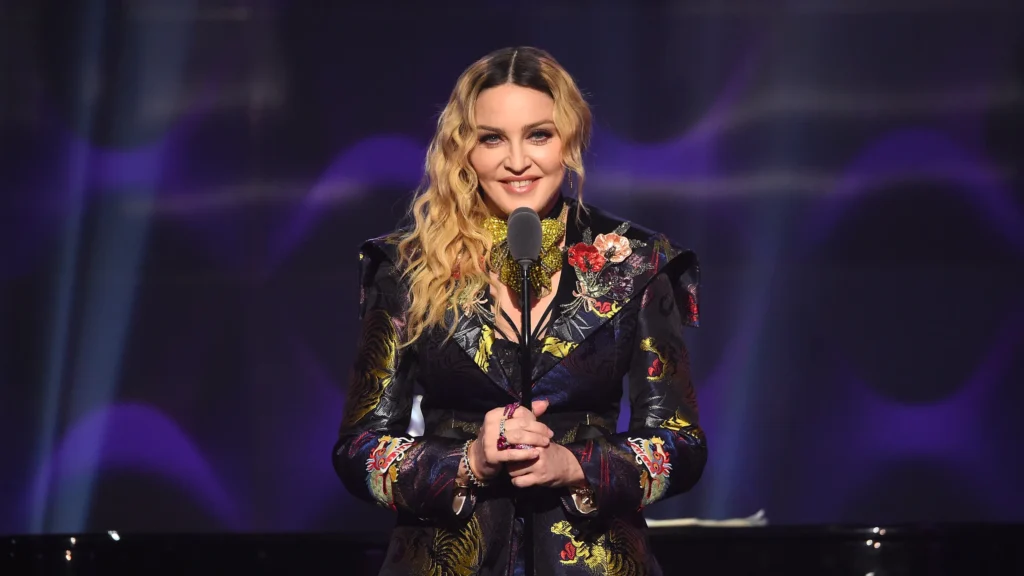
Influence on Other Artists
Madonna’s approach to branding and self-promotion has left a significant imprint on the pop music industry, influencing generations of artists who followed. Her masterful blend of music, image, and persona has set a blueprint for artists to not only showcase their musical talents but also craft compelling narratives that resonate with audiences globally. Artists like Lady Gaga, Beyoncé, and Rihanna have followed in her footsteps, using strong visual identities and personal narratives to amplify their music and connect with fans on a deeper level. Madonna demonstrated that an artist could be both a musical icon and a global brand, leading many to adopt a multi-faceted approach to their careers that includes fashion, acting, and even directing, much like she did.
Lessons from Madonna’s Career
Current and aspiring musicians can learn several key lessons from Madonna’s business strategies. First, the importance of continually reinventing oneself to stay relevant in a rapidly changing industry cannot be overstated. Madonna’s career exemplifies how adapting one’s style and sound can appeal to new audiences without alienating existing fans. Secondly, the strategic use of controversy to garner media attention and stimulate public discourse can be a powerful tool if used wisely and ethically. Finally, Madonna’s example shows the importance of maintaining control over one’s public image and narrative, making strategic partnerships that align with one’s brand, and diversifying one’s interests to build a lasting legacy.
The Future of Branding in Pop Music
Looking to the future, branding in pop music will likely continue to evolve, with Madonna’s career providing key insights into potential trends. Personal branding will become even more intertwined with artists’ authentic personal stories, as fans increasingly value transparency and genuineness. Social media and technology will play even larger roles, with artists using platforms not just for promotion but as integral elements of their artistic expression—similar to how Madonna used MTV in the early days of her career.
Moreover, as global influences continue to permeate the music industry, artists will likely adopt more internationally diverse elements into their branding, following Madonna’s example of incorporating various cultural influences into her music and public persona. This might include more cross-cultural collaborations and a greater emphasis on global social issues, which can resonate on a worldwide scale.
In conclusion, Madonna’s impact on the music industry extends beyond her own substantial achievements; it lies in how she has shaped the strategies behind music branding itself. Her career provides a valuable template and a source of inspiration for how artists can navigate their paths through the complexities of fame, artistry, and personal branding in the modern music landscape.
